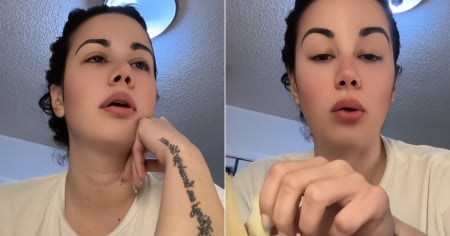A TikTok video, published by the user @izzys33, has sparked controversy and divided opinions on social media. In the recording, the young Cuban showcases a plate of food that, as she recounts, she is eating thanks to the charity of a neighbor due to the difficult economic situation on the island.
However, what has caught the most attention from internet users is not her complaint, but her impeccably manicured acrylic nails.
In the video, as the young woman shares her experience, numerous comments began to appear questioning her appearance. “Her nails are painted nicely; she doesn’t seem to be doing that badly,” commented one user.
Others pointed out her well-groomed hair and her strong tone of voice, implying that her situation does not reflect a genuine need.
Among the most popular comments, one joked: “If you're going to suffer, suffer when you can't paint your nails.” Another added: “With a supportive neighbor, a balanced meal, and those nails, it doesn't seem that bad.”
The debate that has arisen around the video reflects opposing views. Some users defend the young woman, arguing that her self-care does not invalidate her complaint about the shortage of food in Cuba.
"Having well-groomed nails doesn't mean you won't go hungry. In Cuba, even the basics are a luxury," commented a follower.
On the other hand, there are those who criticize what they see as a contradiction. They point out that maintaining acrylic nails involves a high cost in the Cuban context, where aesthetic services are hard to afford for those facing economic difficulties.
The video also highlights the complexities of daily life on the island, where the scarcity of food and basic goods coexists with the ingenuity of Cubans in maintaining their personal appearance and well-being, often thanks to external aid or solidarity exchanges among neighbors.
The young woman has yet to respond to the comments, but her video has sparked a conversation about the prejudices and expectations placed on those who express their economic struggles on social media. Meanwhile, the debate remains active, reflecting the complex and often contradictory reality faced by Cubans.
Frequently Asked Questions About the Situation in Cuba and Perception on Social Media
Why did the video of the young Cuban woman generate so much controversy on social media?
The video sparked controversy because, while the young woman denounced the food shortages in Cuba, many users focused on criticizing her appearance, particularly her well-kept acrylic nails. The attention shifted to her personal appearance instead of her message about the scarcity of food.
What does the debate about the appearance of Cubans on social media reveal?
The debate reflects prejudice and expectations regarding how people should look in times of economic hardship. Personal appearance becomes a point of judgment, overlooking the complexity of economic struggles in Cuba.
How do Cubans manage to maintain their appearance amidst the economic crisis?
Despite the economic crisis, many Cubans demonstrate ingenuity in maintaining their appearance, often with the help of neighbors or through supportive exchanges. Personal aesthetics, although expensive, are seen by some as a small luxury or a way to uphold dignity.
What role do social media play in the perception of Cuban reality?
Social media amplify the voices and experiences of Cubans, but they can also distort the perception of their reality. Comments and discussions on platforms like TikTok reflect both support and criticism towards those who denounce living conditions in Cuba.
Filed under:
